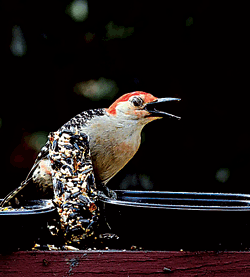MORE ON BIRDS AND CLIMATE
 Recently I wrote an article which I titled, Birds and Climate Change. In that article I listed summer birds I’ve seen this winter. By summer birds I mean birds that normally migrate, birds that leave northern Indiana and go south for the winter. I wrote that I’ve seen more summer birds in northern Indiana this winter than ever before, robins and red-winged blackbirds, a grackle and a cowbird, a song sparrow and a white-crowned sparrow.
Recently I wrote an article which I titled, Birds and Climate Change. In that article I listed summer birds I’ve seen this winter. By summer birds I mean birds that normally migrate, birds that leave northern Indiana and go south for the winter. I wrote that I’ve seen more summer birds in northern Indiana this winter than ever before, robins and red-winged blackbirds, a grackle and a cowbird, a song sparrow and a white-crowned sparrow.
This is the time of year to see snow buntings and Lapland longspurs in northern Indiana, and snowy owls and rough-legged hawks, not robins and red-winged blackbirds.
I’m not the only birder in northern Indiana who has seen summer birds this winter. On the Internet I’ve seen reports of song sparrows, white-throated sparrows, field sparrows, a catbird and red-headed woodpeckers. Recently I saw a report of goldeneyes, hooded mergansers and a pied-billed grebe.
I’m seeing winter birds too, species that migrate from farther north and visit northern Indiana only in winter. Tree sparrows and dark-eyed juncos are coming to my bird feeders daily. I’ve seen reports of those birds and of redpolls and pine siskins on the Internet. I’ve seen reports of long-eared and short-eared owls but no snowy owls.
Until a week or two before Christmas the weather in northern Indiana was unusually mild for winter. That has since changed but those summer birds are still here. There’s a white-throated sparrow on the ground beneath my bird feeder now, feeding with tree sparrows and dark-eyed juncos on seeds knocked off the platform of the feeder by other birds and squirrels.
I speculated in my earlier article about summer birds in northern Indiana in winter that climate change, global warming, may be the reason for those birds being here this time of year. Now I wonder, in spite of the change in weather, the colder weather since my earlier article, are we going to have an early spring?
Birds are said to be able to foretell changes of the weather. As a boy I was told if birds start going into shelter a storm is coming. As a boy when I went for a hike, particularly along the river near our home, Mother or Dad often told me to watch the birds and if the birds started going to cover, getting into thick vegetation, becoming hard to spot, I’d better head for home, there was a storm coming. (I didn’t have to be told to watch the birds. I always looked for and watched birds.)
Birds are not infallible weather forecasters however. I’ve read of birds being caught in severe storms, especially winter storms. There’s an account in one of my books, with a photograph, of hundreds of snow buntings, dead, on an ice and snow covered lake after a winter blizzard in Iowa.
Weather and climate are different of course. Weather makes up climate and weather affects bird migration. Birds migrate when weather conditions are favorable. Birds fly with the wind, not into it when they migrate and they don’t migrate when it’s raining. Since birds are aware of weather and since it effects their migration, why shouldn’t they be aware of climate?
Climate is changing. Last year the average temperature around the world was the warmest on record. This year has started out to be equally warm or even warmer. So why can’t that be the reason, or at least one of the reasons for the white-throated sparrow, the song sparrow, the red-winged blackbirds and grackle and cowbird, the summer birds that have been coming to my bird feeder this winter and for the other summer birds that have been reported in northern Indiana already this year?
- Birds As Weather Forecasters – Life In The Outdoors - December 17, 2021
- Rare Bird Spotted In Indiana – Life In The Outdoors - October 8, 2021
- MY EXPERIENCE WITH DEER – Life In The Outdoors - July 30, 2021


